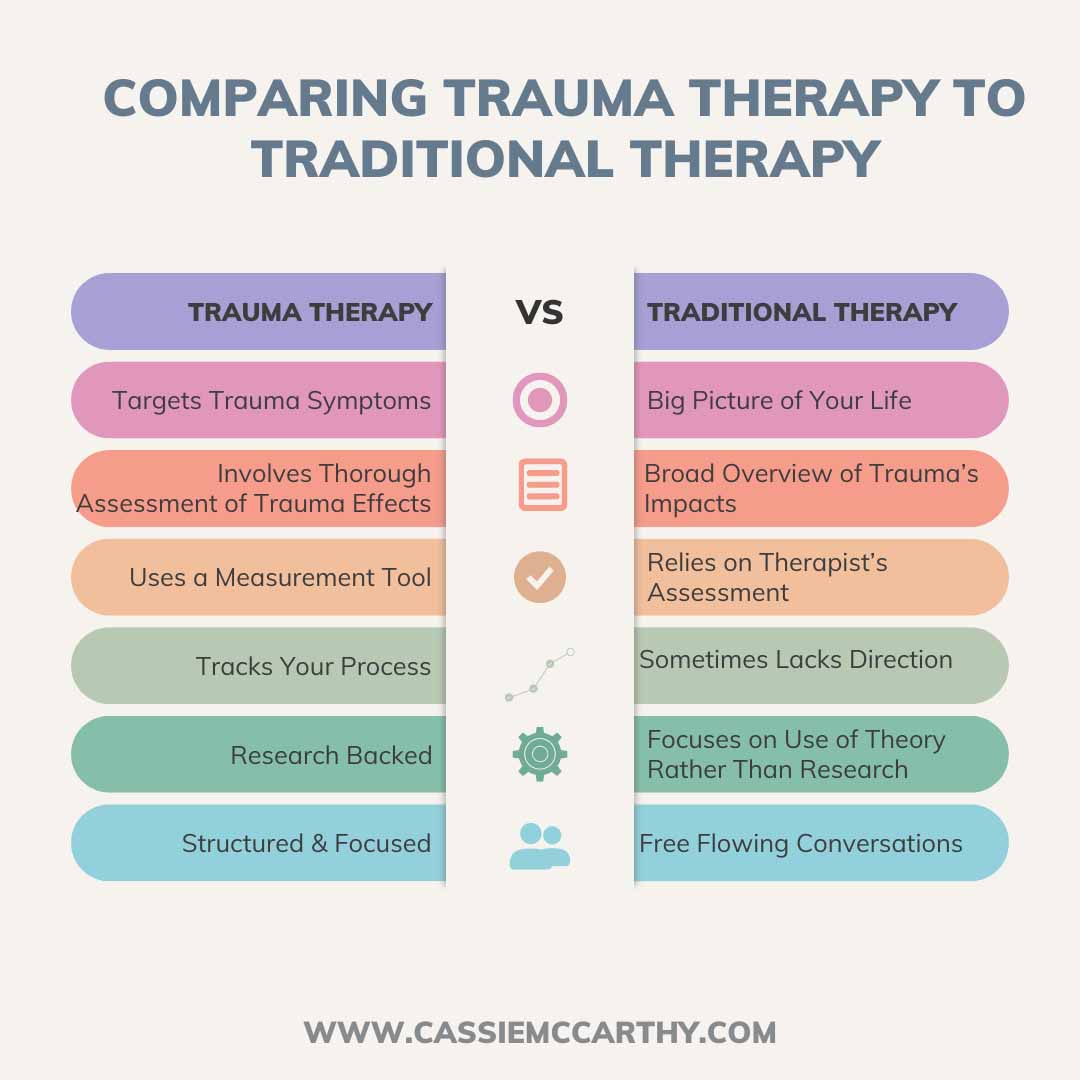Everything You Need to Know to Choose the Right Therapist and Heal Your Past
Curious about trauma therapy and how it could help you? You’re in the right place.
Have you tried therapy before but felt it didn’t quite work for you? It might be because you were doing traditional talk therapy, which can be helpful for many issues, but when it comes to healing trauma, you might need something more specialized—like trauma therapy.
Trauma therapy is a research-backed approach specifically designed to help people recover from emotional, physical, or sexual trauma. Unlike traditional therapy, trauma therapy uses a structured process to guide you through healing from painful, frightening, or violent experiences. With the right approach, your past doesn’t have to define your future.
In this post, we’ll explore all aspects of trauma therapy to help you decide if it’s the right approach for your healing journey. Here’s what we’ll cover:
What Is Trauma Therapy?
Trauma therapy is a specialized form of therapy designed to help people heal from painful or overwhelming experiences that still affect their lives today. Unlike traditional talk therapy, which often focuses on emotions, trauma therapy is structured and goal-oriented. It’s about retraining your brain to process trauma differently, so you’re not living in a constant state of fear, anxiety, or self-blame.
In trauma therapy, I use evidence-based approaches like Cognitive Processing Therapy (CPT) to help clients understand how their brains have been shaped by trauma—and more importantly, how to change those patterns. It’s not about reliving the worst moments; it’s about learning the skills that allow you to finally feel safe in your own mind and body.
What is Trauma?
Trauma is any event where you felt threatened—physically, emotionally, financially, sexually, or relationally. Many people think trauma only happens to war veterans, but more commonly, it comes from feeling betrayed or harmed by someone you trusted. It rewires how you think and feel afterward, leaving you with deep feelings of shame, self-blame, and guilt. Trauma can also show up physically, through constant anxiety, feeling on edge, or even irritability. It impacts every part of your life, often without you even realizing it.
Who Should Go to Trauma Therapy?
Trauma therapy is for anyone who feels burdened by past experiences that still affect their day-to-day life or relationships. Whether it’s overwhelming anxiety, trust issues, or just feeling stuck, trauma therapy can help you move forward. Consider trauma therapy if:
- You keep thinking about the past, even when you don’t want to.
- You experience nightmares, flashbacks, or intrusive thoughts.
- Trusting others feels hard, or you feel disconnected from people.
- You live with constant anxiety, fear, or irritability.
- Guilt, shame, or self-blame weigh heavily on you.
- Traditional talk therapy hasn’t fully helped you.
- You want practical tools to manage your emotions and feel unstuck.
If any of this sounds familiar, trauma therapy can provide the support you need to heal.
How Does Trauma Therapy Work?
Trauma therapy helps you move beyond the pain of your past and take control of your life. Rather than just talking about what happened, it focuses on changing how your brain processes painful memories. Here’s how it works:
- Getting to the Root of the Pain: We’ll identify the events that have shaped your thoughts and feelings, so you can begin healing from the core of your trauma.
- Challenging Negative Thoughts: You’ll learn to challenge the cycles of guilt, shame, and self-blame that keep you stuck.
- Learning Practical Coping Skills: Therapy provides tools to manage overwhelming emotions and anxiety, giving you control over your thoughts instead of the other way around.
- Reframing the Trauma: We’ll work to reframe painful memories so they don’t hold the same power over you.
- Rebuilding Trust and Safety: Therapy helps you regain trust—both in yourself and in your relationships.
- Setting Boundaries and Gaining Confidence: You’ll learn to set healthy boundaries and build the confidence to stand up for yourself, without guilt.
Measuring Progress: We’ll track your healing journey, so you’ll see your progress clearly and know that you’re moving forward.
What Makes Trauma Therapy Different From Traditional Talk Therapy?
Trauma therapy offers a more targeted, structured approach to healing than traditional talk therapy. Here’s why:
- Uses a Measurement Tool: We regularly assess your progress to make sure you’re moving forward.
- You See Progress Within 6-8 Sessions: You’ll start feeling relief and seeing results much faster than with traditional talk therapy.
- Stays Up-to-Date with Trauma Research: Trauma therapy evolves with the latest research, ensuring you’re getting the best care.
- Evidence-Based Practice: You’ll be using methods that are backed by research and proven effective.
- Brain-Based / Science-Backed: Therapy rewires how your brain responds to trauma, helping you regain control over your emotions.
- Structured Approach: Each session follows a clear plan to ensure you’re making progress.
- Researched and Proven Effective: Cognitive Processing Therapy (CPT) is one of the most effective methods for trauma recovery.
- Practical and Not Theoretical: You’ll gain skills you can use in your daily life to reduce the impact of trauma.
What Should I Expect From Trauma Therapy Sessions?
Trauma therapy sessions are designed to be structured and focused on results. Here’s what to expect:
- Measuring & Monitoring Progress: We start each session by assessing how far you’ve come.
- Reviewing Last Week’s Homework: We’ll go over any assignments and challenges you faced.
- Learning New Skills: Each session provides practical tools for managing your thoughts and emotions.
- Practicing Skills: You’ll practice the new techniques during the session to build confidence.
- Review Next Homework Assignment: We’ll assign homework that reinforces your progress and keeps you on track.
Is Trauma Therapy Right For You?
If you’ve tried other forms of therapy but still feel stuck, or if you’re constantly reliving the past, trauma therapy may be exactly what you need. Trauma therapy is structured, research-backed, and provides real, measurable results. If you’re ready to stop letting the past control your life and start feeling more empowered, trauma therapy can help you move forward.
Ready to Start Your Healing Journey?
Trauma therapy isn’t just about talking—it’s about healing. You don’t have to live in the shadow of your past anymore. If you’re ready to feel safe, empowered, and in control of your life again, trauma therapy can help. Schedule a free 20-minute consultation today to learn how trauma therapy can change your life.
FAQ: Your Questions About Trauma Therapy
Click or tap any question to see the answer. Click or tap again to close.
What is trauma therapy?
Trauma therapy is a structured approach to help you heal from emotional, physical, or psychological trauma. It’s about retraining your brain to process what happened so it doesn’t control your life anymore. It’s not just talking—it’s practical and focused on real healing.
Who is trauma therapy for?
Trauma therapy is for anyone feeling stuck in their past. Whether it’s emotional, physical, or sexual trauma, or you’re dealing with PTSD, this therapy helps you move forward and reclaim control of your life.
How is trauma therapy different from regular therapy?
Unlike traditional therapy, trauma therapy is action-oriented. It’s structured, uses measurable tools, and you’ll start to feel results in as little as 6-8 sessions. It’s focused on real change, not just talking through feelings.
What can I expect from a trauma therapy session?
Each session is about progress. We’ll check in, review your homework, learn new tools, and practice them so you can apply them right away. You’ll leave each session with something useful to work on.
Do I have to talk about my trauma in detail?
No, you don’t. Trauma therapy is more about teaching your brain to process the trauma differently, not rehashing every detail. We focus on helping you feel better now.
How long does trauma therapy take?
Trauma therapy is short-term. Most people feel relief in 5-6 sessions, and a full course typically takes 12 sessions. The goal is to equip you with tools so you don’t need long-term therapy.
Is trauma therapy effective for PTSD?
Yes. Trauma therapy, especially Cognitive Processing Therapy (CPT), is proven to help people with PTSD. It reduces trauma symptoms and helps you feel safe and in control again.



